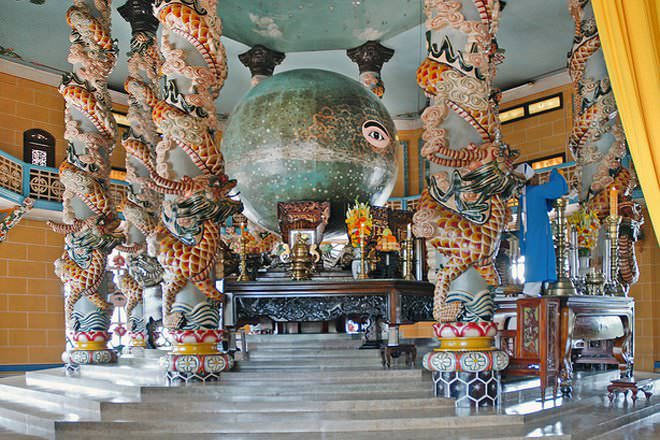| Scriptures | 1)Prayers of the Heavenly and Earthly Way. 2)The Religious Constitution of Cao Daism. 3)The New Canonical Codes. 4)Compilation of Divine Messages. 5)Sermons of His Holiness, Ho Phap Pham Cong Tac. |
Analects of Confucius and Mencius; I Ching; Doctrine of Mean, etc. |
|---|
| Founder | Ngo Van Chieu. |
Kong Qiu (Confucius) |
|---|
| Place of origin | Vietnam |
China |
|---|
| Use of statues and pictures | Common |
Permitted. |
|---|
| Practices | Prayer, Veneration of ancestors, Nonviolence, and vegetarianism. |
Visit to temples to pay homage to Ti'en (while it can refer to God or Heaven, it traditionally refers to social power), Confucius, and ancestors; To practice ('Jing zuo, ') or 'Quiet Sitting', a neo-Confucian seeking of self-cultivation. |
|---|
| Concept of Deity | One God |
Most believe in One God, but this is not necessary since Confucianism is not a religion but a belief system about social ordering. |
|---|
| Literal Meaning | God's Palace. |
Disciple of Confucius. |
|---|
| Place of worship | Temple. |
Temples. |
|---|
| Clergy | Priests, etc. |
Bureaucrats. |
|---|
| Principle | All religions should become one world religion. |
Key principles are Ren (benevolence), Yi (righteousness), Li (propriety/ritual), Zhi (Wisdom), Xin (trustworthiness), Xiao (filial piety), Zhong (loyalty), Min (diligence) and Hui (kindness). Ren, Yi, Li, Zhi, and Xin are the "Five Constants". |
|---|
| Belief of God | One God. Ancestors are also worshipped. |
Depending on the religion held, usually Buddhist. Confucianism is not strictly a religion but rather advises a schema of social order. |
|---|
| Goal of religion | To unite all the world religions into one religion. |
To have a structured society. |
|---|
| Time of origin | Early part of the 20'Th Century. |
Approx. 550 B.C.E.(Before Common Era) |
|---|
| Geographical distribution and predominance | Vietnam, North America. |
Asia. |
|---|
| Branches | Tay Ninh Holy See, Chieu Minh, Ben Tre, Da Nang, etc. |
Han Confucianism; Neo Confucianism; Contemporary Confucianism; Japanese Confucianism; Korean Confucianism; Vietnamese Confucianism; Boston Confucianism. |
|---|
| View of other Dharmic religions | Buddha is counted amongst Cao Dai's religious figures. |
Confucianists usually follow Buddhism, which is a Dharmic religion. |
|---|
| View of the Buddha | Buddha is one of the religious figures revered in Cao Dai. |
Buddha is followed by many Confucians. |
|---|
| Holy days/Official Holidays | Hoi Yen Dieo Tri |
Chinese New Year, Teacher Day, Ancestor Day. |
|---|
| Concept of God | Before God Existed, there was the concept of the Tao. God was Born from the Big Bang. |
One God. |
|---|
| View of Oriental religions | Confucius and Lao Tzu are also included among Cao Dai's religious figures. They also worship ancestors, & other spirits, by Oriental religious beliefs. |
Confucianists usually follow other Oriental religions too. |
|---|
| Holy days | Hoi Yen Dieu Tri |
Chinese New Year, Teacher Day, Ancestor Day. |
|---|
| View of other Oriental religions | Believes that all religions should unite as one religion. |
Usually follows other Oriental religions, especially Taoism. |
|---|
| Original Languages | Vietnamese. |
Mandarin or Cantonese |
|---|
| Original Language(s) | Vietnamese |
Mandarin or Cantonese |
|---|
| Views on other religion | All religions should unite and become one. |
Sees no contraction in following more than one religion. |
|---|
| Belief | Figures from all religions. |
Confucianism is sometimes mistakenly seen as a religion but it is really a philosophy of China, and of Asia as a whole. It stresses human conduct over belief in God. |
|---|
| Authority of Dalai Lama | N/A. |
N/A. |
|---|


Comments: Cao Dai vs Confucianism